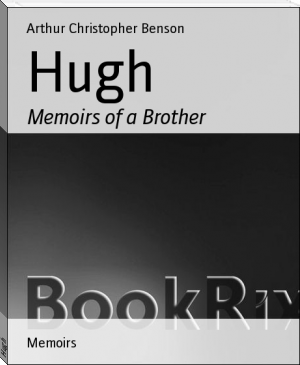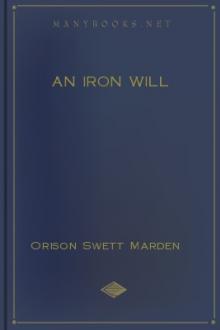Hugh by Arthur Christopher Benson (best ebook reader for ubuntu .txt) 📕

- Author: Arthur Christopher Benson
Book online «Hugh by Arthur Christopher Benson (best ebook reader for ubuntu .txt) 📕». Author Arthur Christopher Benson
Hugh went abroad for a short time to learn French, with a party of Indian Civil Service candidates, and no doubt forgot to write home, for I find the following characteristic letter of my father's to him:
Lambeth Palace, S.E., _30th June_ 1889.
My dearest Hughie,--We have been rather mourning about
not hearing one word from you. We _supposed_ all would be right as
you were a large party. But _one_ word would be so easy to those
who love you so, who have done all they could to enable you to
follow your own line, against their own wishes and affection!
We hope at any rate you are writing to-day. And we have sent off
"Pioneers and Founders," which we hope will both give you happy
and interesting Sunday reading, and remind you of us.
Mr. Spiers writes that you are backward in French but getting on
rather fast.
I want you now at the beginning of this cramming year to make two
or three Resolutions, besides those which you know and have
thought of often and practised:
1. To determine never to do any secular examination work on
Sundays--to keep all reading that day as fitting "The _Lord's_
Day" and the "Day of Rest."
I had a poor friend who would have done very well at Oxford, but
he would make no difference between Sunday and other days. He
worked on just the same and in the Examination _itself_, just as
the goal was reached, he broke down and took no degree. The
doctors said it was all owing to the continuous nervous strain. If
he had taken the Sundays it would just have saved him.
Lord Selborne was once telling me of his tremendous work at one
time, and he said, "I never could have done it, but that I took my
Sundays. I never would work on them."
2. We have arranged for you to go over to the Holy Communion one
day at Dinan. Perhaps some nice fellow will go with you--Mr.
Spiers will anyhow. Tell us _which_ Sunday, so that we may all be
with you [Greek: en pneumati].
Last night we dined at the Speaker's to meet, the Prince and
Princess of Wales. It was very interesting. The Terrace of the
House of Commons was lighted with electric light. A steamer went
by and cheered!
The Shah will fill London with grand spectacles, and I suppose his
coming will have much effect on politics--perhaps on _India_ too.
All are well.--Ever your most loving father,
Edw. Cantuar.
I am going to preach at the Abbey to-night.
Hugh failed, however, to secure a place in the Indian Civil Service, and it was decided that he should go up to Trinity College, Cambridge, and read for classical honours.
Up to this date I do not think that anything very conscious or definite had been going on in Hugh's mind or heart. He always said himself that it astonished him on looking back to think how purely negative and undeveloped his early life had been, and how it had been lived on entirely superficial lines, without plans or ambitions, simply taking things as they came.
I think it was quite true that it was so; his emotions were dormant, his powers were dormant. I do not think he had either great affections or great friendships. He liked companionship and amusement, he avoided what bored him; he had no inclinations to evil, but neither had he any marked inclinations to what was good. Neither had any of his many and varied gifts and accomplishments showed themselves. I used to think latterly that he was one of the most gifted people I had ever seen in all artistic ways. Whatever he took up he seemed able to do, without any apprenticeship or drudgery. Music, painting, drawing, carving, designing--he took them all up in turn; and I used to feel that if he had devoted himself to any one of them he could have reached a high excellence. Even his literary gifts, so various and admirable, showed but few signs of their presence in the early days; he was not in the least precocious. I think that on the whole it was beneficial to him that his energies all lay fallow. My father, stern as his conception of duty was, had a horror of applying any intellectual pressure to us. I myself must confess that I was distinctly idle and dilettante both as a boy at Eton and as a Cambridge undergraduate. But much as my father appreciated and applauded any little successes, I was often surprised that I was never taken to task for my poor performances in work and scholarship. The truth was that my eldest brother's death at Winchester was supposed partly to have been due to his extraordinary intellectual and mental development, and I am sure that my father was afraid of over-stimulating our mental energies. I feel certain that what was going on in Hugh's case all the time was a keen exercise of observation. I have no doubt that his brain was receiving and gaining impressions of every kind, and that his mind was not really inactive--it was only unconsciously amassing material. He had a very quick and delighted perception of human temperament, of the looks, gestures, words, mannerisms, habits, and oddities of human beings. If Hugh had been born in a household professionally artistic, and had been trained in art of any kind, I think he would very likely have become an accomplished artist or musician, and probably have shown great precocity. But he was never an artist in the sense that art was a torment to him, or that he made any sacrifice of other aims to it. It was always just a part of existence to him, and of the nature of an amusement, though in so far as it represented the need of self-expression in forms of beauty, it underlay and permeated the whole of his life.
The first sign of his artistic enthusiasm awakening was during his time in London, when he conceived an intense admiration for the music and ceremony of St. Paul's. Sir George Martin, on whom my father had conferred a musical degree, was very kind to him, and allowed Hugh to frequent the organ-loft. "To me," Hugh once wrote, "music is the great reservoir of emotion from which flow out streams of salvation." But this was not only a musical devotion. I believe that he now conceived, or rather perhaps developed, a sense of the symbolical poetry of religious rites and ceremonies which remained with him to the end. It is true to say that the force and quality of ritual, as a province of art, has been greatly neglected and overlooked. It is not for a moment to be regarded as a purely artistic thing; but it most undoubtedly has an attraction and a fascination as clear and as sharply defined as the attraction of music, poetry, painting or drama. All art is an attempt to express a sense of the overwhelming power of beauty. It is hard to say what beauty is, but it seems to be one of the inherent qualities of the Unknown, an essential part of the Divine mind. In England we are so stupid and so concrete that we are apt to think of a musician as one who arranges chords, and of a painter as one who copies natural effects. It is not really that at all. The artist is in reality struggling with an idea, which idea is a consciousness of an amazing and adorable quality in things, which affects him passionately and to which he must give expression. The form which his expression takes is conditioned by the sharpness of his perception in some direction or other. To the musician, notes and intervals and vibrations are just the fairy flights and dances of forms audible to the ear; to the painter, it is a question of shapes and colours perceptible to the eye. The dramatist sees the same beauty in the interplay of human emotion; while it may be maintained that holiness itself is a passionate perception of moral beauty, and that the saint is attracted by purity and compassion, and repelled by sin, disorder, and selfishness, in the same way as the artist is attracted and repelled by visible charm and ugliness.
Ritual has been as a rule so closely annexed to religion--though all spectacular delights and ceremonies have the same quality--that it has never been reckoned among artistic predilections. The aim of ritual is, I believe, a high poetry of which the essence is symbolism and mystery. The movement of forms solemnly vested, and with a background of architecture and music, produces an emotion quite distinct from other artistic emotions. It is a method, like all other arts, through which a human being arrives at a sense of mysterious beauty, and it evokes in mystical minds a passion to express themselves in just that way and no other, and to celebrate thus their sense of the unknown.
But there has always been a natural terror in the religious mind of laying too much stress on this, or of seeming to encourage too much an aesthetic emotion. If the first business of religion is to purify life, there will always be a suspicion of idolatry about ritual, a fear of substituting a vague desire for beauty for a practical devotion to right conduct.
Hugh wrote to me some years later what he felt about it all:
"... Liturgy, to my mind, is nothing more than a very fine and
splendid art, conveying things, to people who possess the
liturgical faculty, in an extraordinarily dramatic and vivid way.
I further believe that this is an art which has been gradually
brought nearer and nearer perfection by being tested and developed
through nineteen centuries, by every kind of mind and nationality.
The way in which it does, indisputably, appeal to such very
different kinds of people, and unite them, does, quite apart from
other things, give it a place with music and painting.
* * * * *
"I do frankly acknowledge Liturgy to be no more than an art--and
therefore not in the least generally necessary to salvation; and I
do not in the least 'condemn' people who do not appreciate it. It
is only a way of presenting facts--and, in the case of Holy Week
Ceremonies, these facts are such as those of the Passion of
Christ, the sins of men, the Resurrection and the Sovereignty of
Christ."
*





Comments (0)